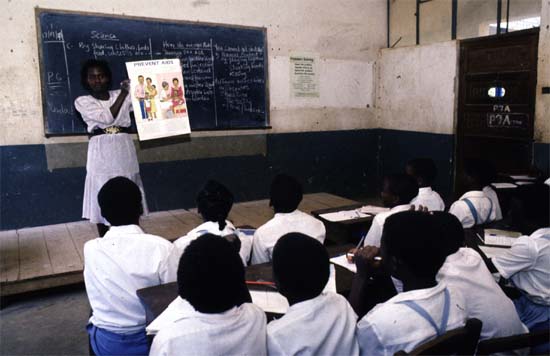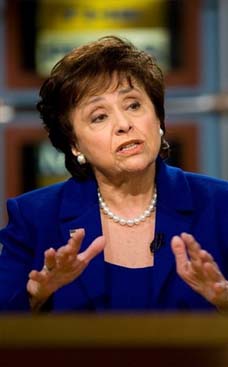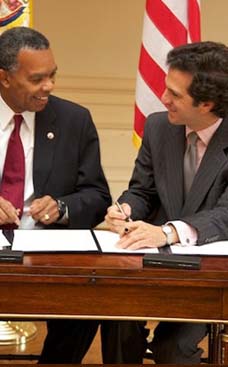
Will Dickinson went to Armenia in 2004 to help teach children about clean water and trash cleanup. Local teachers were already doing that, so he tried mapping trails for hiking and cross-country skiing. But as a lone volunteer he couldn't address the issues of property ownership and land use, which were sensitive topics in post-Soviet Armenia. He was left offering little by way of sustainable programs. He was frustrated because he says he joined the Peace Corps to gain professional experience in economic development. "All I could do was befriend some members of the community," he says. He tried finding out what other volunteers in Armenia had done before him, but no luck. He says the Peace Corps does not do a good job of tracking and sharing the development work, so volunteers are constantly reinventing the wheel. "There is no institutional memory," he says. When he returned home, he joined another Peace Corps volunteer to create Peace Corps Wiki, an online site where volunteers share their work and experiences. Those who want changes say the agency is too focused on increasing the number of volunteers, not the quality of volunteers; does a poor job of sending volunteers to countries where they are most needed and fails as a development agency. "The Peace Corps has wasted the last 50 years because it has failed to document which projects work and failed to take them to scale," says Chuck Ludlam, a two-time volunteer who along with his wife testified before Congress in 2007 about overhauling the Peace Corps.
Peace Corps has no institutional memory say volunteers
Call to service inspired many Peace Corps volunteers
By Chris Hawley and Marisol Bello, USA TODAY
CANO NEGRO, Costa Rica - On a pitch-black night in March 2009, a bus chugged into this Central American village, opened its door and deposited one terrified American on a dirt road beside the Caño Negro swamp.
Peace Corps volunteer Mick Wigal was equipped with little more than a duffel bag of clothes, some mosquito netting and a vague mission from the U.S. government: Go out and help this village prosper.
"I was scared to death," says Wigal, 29, of Youngstown, Ohio. "All I could think was, 'What am I doing here?' "
Wigal joined the Peace Corps to travel, gain work experience and understand different cultures. Eighteen months later, he got his wish - and then some. He labors every day to achieve his mission of helping residents set up cottage industries, and he does it with almost no money and against daunting odds.
TIMELINE: Peace Corps, 1960 to present
STARTING YOUNG: Some call tweens the 'We Generation'
Fifty years ago today, President Kennedy issued a stirring call to college students to volunteer in developing countries, a speech that led to the creation of the Peace Corps. A half-century later, the agency still inspires young people to serve.
The mission of the U.S.-sponsored agency then and now has been to help countries create and sustain development programs, promote a better understanding of Americans, and help Americans better understand people outside the USA. It has evolved from an organization in which most volunteers worked as teachers to one in which they also work on economic development, HIV/AIDS education and environmental and technology programs.
"The wonderful thing about Peace Corps today is that we continue to provide that bridge to accomplish great things around the world, person to person, community by community," says Peace Corps director Aaron Williams, a volunteer who went to the Dominican Republic in 1967.
Yet critics say the organization has not taken a serious look at how well it has carried out its mission. Instead, they say it lives off its storied past, unwilling to become more relevant for the 21st century when - unlike in the 1960s - the Peace Corps has more competition as Americans look for opportunities to travel and serve abroad.
"The Peace Corps is founded on mythology and anecdote," says Robert Strauss, a Peace Corps volunteer in 1978 and former country director in Cameroon. "Why not take a deeper look at what success means? What are the key indicators? ... The Peace Corps hasn't done this in any systemic way."
He says he supports the idea of the Peace Corps but wants it to live up to its potential as a more effective development organization.
The organization has fallen short in other ways, some say. It never has come close to Kennedy's goal of 100,000 volunteers a year. Through the years, 200,000 volunteers have joined the Corps, which saw a high of 15,000 volunteers in 1964. This year, 7,800 volunteers are serving.
"I think (Kennedy) would be greatly disappointed" that the Peace Corps has not expanded, says Harris Wofford, the former Pennsylvania senator who helped create the agency.
Passing the torch
In the pre-dawn hours of Oct. 14, 1960, presidential candidate Kennedy made a campaign stop at the University of Michigan and uttered these words:
"How many of you who are going to be doctors, are willing to spend your days in Ghana? Technicians or engineers, how many of you are willing to work in the Foreign Service and spend your lives traveling around the world? On your willingness to do that, not merely to serve one year or two years in the service, but on your willingness to contribute part of your life to this country, I think, will depend the answer whether a free society can compete."
The excitement of that 2 a.m. speech inspired the idea for the Peace Corps.
The Peace Corps grew out of a wanderlust in the post-World War II generation that wanted to take a stand and contribute to society but felt it had no place to do it, says historian Elizabeth Cobbs Hoffman, author of the book All You Need Is Love: The Peace Corps and the Spirit of the 1960s.
Alan Guskin, 73, caught the energy in Kennedy's message to the Michigan students that drizzly October night. A 23-year-old graduate student, Guskin and his then-wife wrote a letter to the school paper to call on students to help Kennedy win and push for a Peace Corps.
"We felt like the torch was passing on to the new generation," says Guskin, who was among the first group of students to serve in Thailand in 1961.
Wofford, Kennedy aide Warren Wiggins and the agency's first director, Sargent Shriver, set out to create the Peace Corps after Kennedy established the agency by executive order March 1, 1961.
"The vision was big and bold," says Kevin Quigley, head of the National Peace Corps Association who served in Thailand in 1976. "This was a tool to help make the world more peaceful and prosperous."
The Peace Corps has changed some since the beginning, when the average volunteer was 22 and male. Today, 60% of volunteers are women and the average age is 28. Yet the agency still follows the model created in 1961 when the first volunteers did two-year stints in Ghana and Tanzania.
The volunteers are trained, but unlike other U.S. programs that pave roads and build schools, Peace Corps volunteers are supposed to help countries advance on a shoestring. They organize communities with know-how and elbow grease.
Projects fade away
Caño Negro, in the second-poorest county in Costa Rica, is a hamlet of 250 people clustered along an axle-cracking road that runs between the swamp and the Nicaraguan border. Most people live off farming.
The few who live off tourism spend their days waiting for business. Wigal hatched a plan to persuade the women to make pizza in the town's outdoor adobe oven to sell to tourists. The women didn't like it because it took too long to light the fire and heat the oven.
Wigal also was faltering with the English classes he was teaching when attendance dropped off.
"It was a really frustrating time," he says. "There was a lot of anger: 'What am I going to do now?' I took the next three months and just tried to figure it out."
A few years earlier, another Peace Corps volunteer helped the women form a cooperative to build a fish farm. They had no money for fish pens or equipment, so the idea died.
Some Peace Corps projects fail like that, running out of steam after the volunteers leave, says Sara Arguedas, the town mayor.
"Many of their projects last, but others disappear because of a lack of leaders," Arguedas says.
Those who want changes in the agency say the challenges in Costa Rica are not unique.
Will Dickinson went to Armenia in 2004 to help teach children about clean water and trash cleanup. Local teachers were already doing that, so he tried mapping trails for hiking and cross-country skiing. But as a lone volunteer he couldn't address the issues of property ownership and land use, which were sensitive topics in post-Soviet Armenia.
He was left offering little by way of sustainable programs. He was frustrated because he says he joined the Peace Corps to gain professional experience in economic development.
"All I could do was befriend some members of the community," he says. He tried finding out what other volunteers in Armenia had done before him, but no luck. He says the Peace Corps does not do a good job of tracking and sharing the development work, so volunteers are constantly reinventing the wheel.
"There is no institutional memory," he says. When he returned home, he joined another Peace Corps volunteer to create Peace Corps Wiki, an online site where volunteers share their work and experiences.
Those who want changes say the agency is too focused on increasing the number of volunteers, not the quality of volunteers; does a poor job of sending volunteers to countries where they are most needed and fails as a development agency.
"The Peace Corps has wasted the last 50 years because it has failed to document which projects work and failed to take them to scale," says Chuck Ludlam, a two-time volunteer who along with his wife testified before Congress in 2007 about overhauling the Peace Corps.
Peace Corps director Williams says the agency completed a "top to bottom" assessment in June that addresses some of the issues. He says the agency plans to better train volunteers, create stronger partnerships with development and local agencies and improve its technology to better track volunteer projects and share them throughout the organization.
After some fits and starts, Wigal is now practically a local in Caño Negro. He teaches classes on the new computers the town bought with a grant he encouraged officials to go after.
His biggest breakthrough was helping the women find a way to raise money so they can start their fish farm. He showed them how to make purses from old potato chip bags that were washed, folded into strips and woven together. The bags are a hit with tourists and locals. Slowly, Wigal feels he's making a difference.
"You spend the first year just figuring the place out, and the last year trying to get everything done," he says. "You just have to accept that some projects are going to fail and keep pushing on through."













